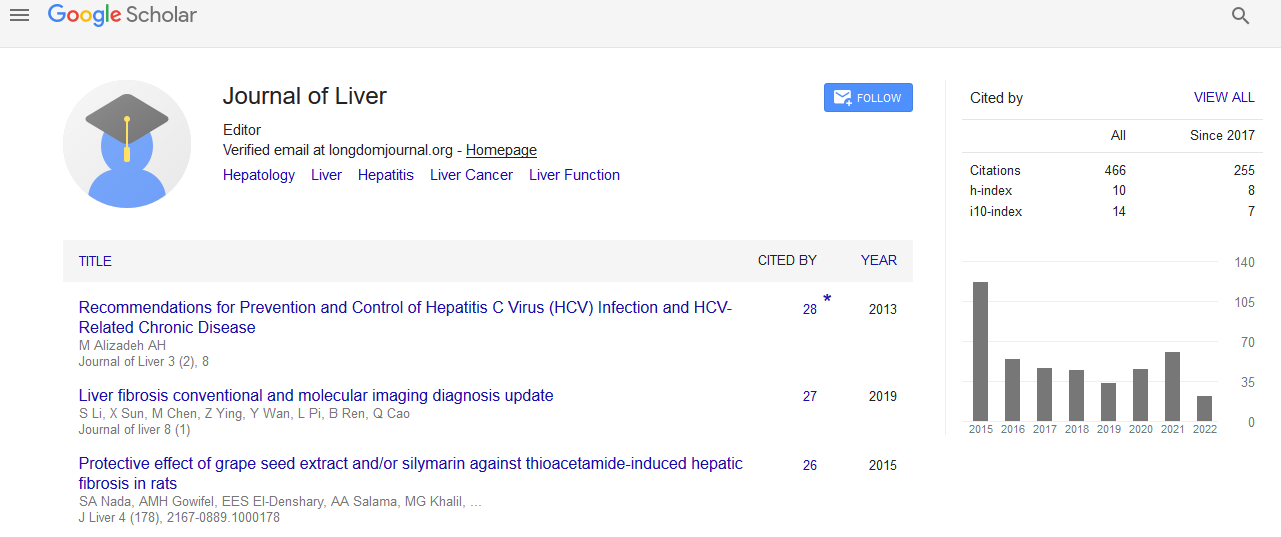PMC/PubMed Indexed Articles
Indexed In
- Open J Gate
- Genamics JournalSeek
- Academic Keys
- RefSeek
- Hamdard University
- EBSCO A-Z
- OCLC- WorldCat
- Publons
- Geneva Foundation for Medical Education and Research
- Google Scholar
Useful Links
Share This Page
Journal Flyer

Open Access Journals
- Agri and Aquaculture
- Biochemistry
- Bioinformatics & Systems Biology
- Business & Management
- Chemistry
- Clinical Sciences
- Engineering
- Food & Nutrition
- General Science
- Genetics & Molecular Biology
- Immunology & Microbiology
- Medical Sciences
- Neuroscience & Psychology
- Nursing & Health Care
- Pharmaceutical Sciences
IGFBP2 activates the NF-úB pathway to drive epithelial-mesenchymal transition and invasive character in pancreatic ductal adenocarcinoma
CO-ORGANIZED EVENT: 5th World Congress on Hepatitis & Liver Diseases & 2nd International Conference on Pancreatic Cancer & Liver Diseases
August 10-12, 2017 London, UK
Wei Zhang
Wake Forest Baptist Comprehensive Cancer Center, USA
Posters & Accepted Abstracts: J Liver
Abstract:
Statement of the Problem: Pancreatic ductal adenocarcinoma (PDAC) is the most lethal type of cancer. A major concern while diagnosing pancreatic cancer is whether or not the cancer has already spread to certain lymph nodes, which is an independent prognosis factor of the malignancy. Given insulin like growth factor binding protein 2 (IGFBP2), a well-known oncogene promoting tumor progression, is elevated in serum of PDAC patients and related to patients�?? prognosis. We are curious to investigate the expression of IGFBP2 in primary PDAC lesion and its clinical significance. Further we are also inquisitive for the molecular basis of its oncogenic role in PDAC. Methodology & Theoretical Orientation: We performed immunohistochemical analysis of relevant signaling proteins in consecutive sections of PDAC tissues. Gene expression profiling and pathway analyses were used to reveal the key signaling pathways. Protein expression and cellular localization were evaluated by western blotting and immunofluorescence assays. In vitro and in vivo approaches were used to reveal the novel nodes in the signaling pathway. Findings: Elevated IGFBP2 expression levels were associated with lymph node metastasis and shorter survival in PDAC patients. Mechanistically, IGFBP2 led to p65 nuclear translocation through the PTEN/PI3K/Akt/IKKb pathway, promoting a NF-kB dependent epithelial-mesenchymal transition (EMT) in PDAC cells. Forced expressing of PTEN or blockage of NF-kB activation by inhibitors of PI3K or IKK restored the epithelial phenotype in the presence of overexpressed IGFBP2. The regulatory relationship of IGFBP2/ nuclear p65/EMT axis, as well as its clinical significance on lymph node metastasis and overall survival, was observed in mouse model and clinical specimens. Conclusion & Significance: The study provides clinical and experimental evidence to support the oncogenic role of IGFBP2 in PDAC. IGFBP2 expression was closely associated with lymph node metastasis and poor survival of PDAC through the PTEN/PI3K/ NF-kB signaling pathway.

